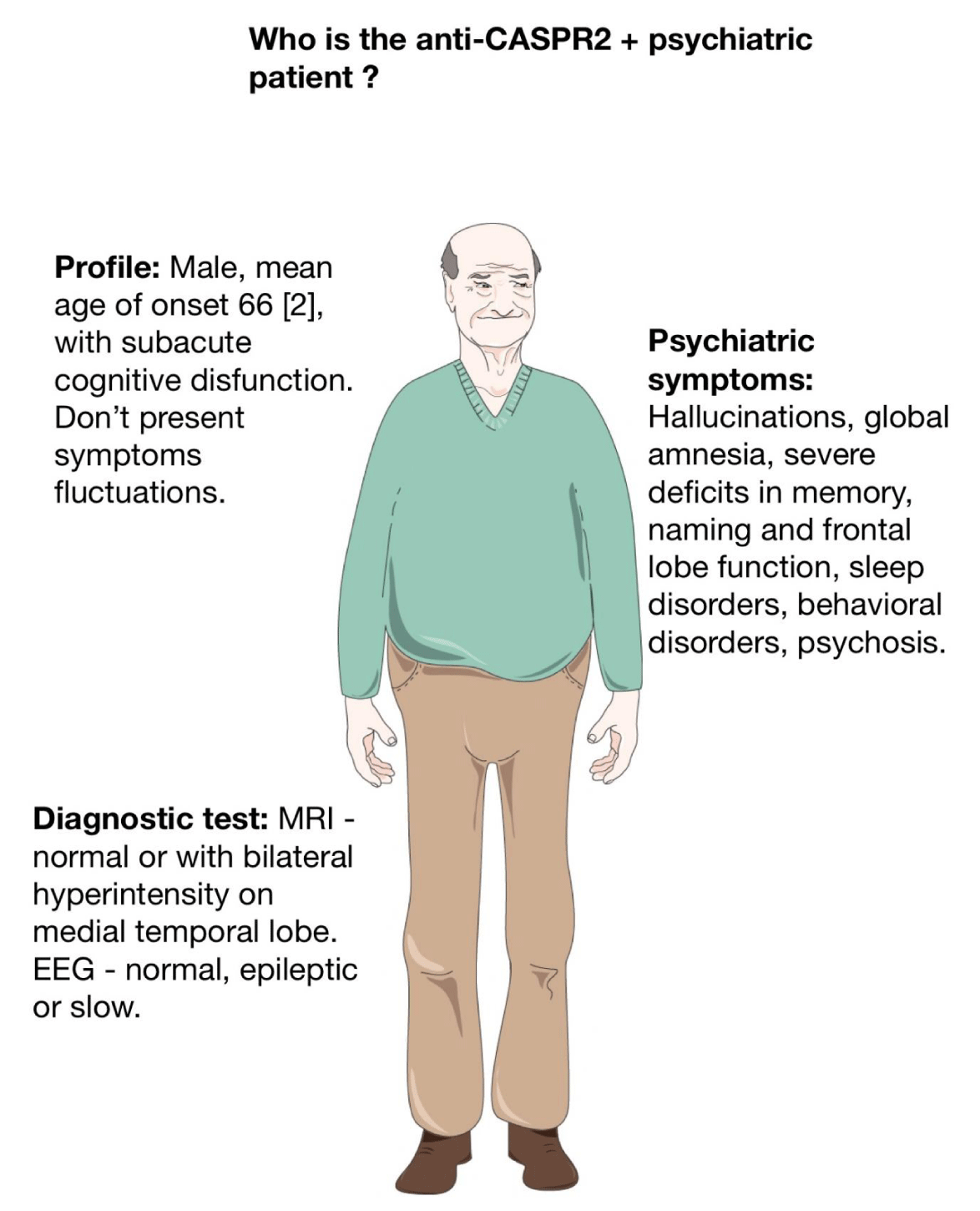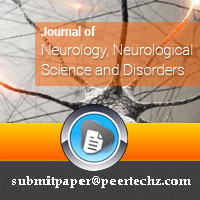Journal of Neurology, Neurological Science and Disorders
Acute psychosis in elderly: do not forget the CASPR2 spectrum as a possible cause
André Ricardo Merkle, Marco Antônio Machado Schlindwein, Letícia Caroline Breis and Marcus Vinícius Magno Gonçalves*
Cite this as
Merkle AR, Machado Schlindwein MA, Breis LC, Magno Gonçalves MV (2020) Acute psychosis in elderly: do not forget the CASPR2 spectrum as a possible cause. J Neurol Neurol Sci Disord 6(1): 008-009. DOI: 10.17352/jnnsd.000037Antibodies against contactin-associated protein 2 (CASPR2), a protein associated with the Voltage-Gated Potassium Channel Complex (VGKC) [1], represent an emerging cause of some old neurological manifestations; such as Morvan’s and Isaacs’ syndromes, as well as a variety of phenotypes encompassing limbic encephalitis, neuropathic pain, late onset epilepsy and dysautonomia [2,3].
Although the prevalence of anti-neuronal surface antibodies and their impact on clinical practice is not well-established [4-7], they represent an important etiology of autoimmune encephalitis and a curable cause of dementia and acute psychosis [8-10].
In a study by Baumgartner, et al. 34% of the patients with autoimmune encephalitis were initially admitted to the psychiatry department. In addition, psychiatry disturbances represent the second most common presentation of autoimmune encephalitis after seizures [11].
When it comes to anti-CASPR2 psychiatric phenotypes, symptoms tend to present in a progressive manner (5-7 months); mostly with no fluctuations, and a tumor is present in 19% of the patients [2,10]. It affects mostly elderly man (Figure 1) [2,12] and clinical presentation ranges from cognitive decline, sleep disorders, depressive mood, global amnesia - especially when associated with anti-Leucine-rich, glioma inactivated 1 (anti-LGI1) antibodies - and psychotic episodes12. Other symptoms, such as seizures, peripheral nerve symptoms and dysautonomia may appear later in the disease, possibly being misdiagnosed as dementia or psychiatric disease [2].
It is important to highlight that most of the patients with anti-CASPR2 have either normal MRI image or hippocampal atrophy, which holds and association with anti-LGI1 antibodies; and therefore the diagnosis may be challenging when facing a case with this suspected etiology [13].
In conclusion, antibodies against CASPR2 should be remembered as a cause of cognitive imbalance or psychosis, especially in elderly men, even with a normal MRI image. Also, if a tumor is not yet known, it is important to make a screening. Finally, anti-CASPR2 disorders respond well to immunotherapy, but may acquire a poor prognosis, especially when treatment is delayed due a misdiagnosis [12].
Author’s contributions
Performed data acquisition and data analysis as well helping with the writing in the text: André Ricardo Merkle, Letícia Caroline Breis, Marco Antônio Machado Schlindwein.
Made substantial contributions to conception and design of the study, as well as provided technical support: Marcus Vinicius Magno Gonçalves MD PhD.
- Saint‐Martin, M, Joubert, B, Pellier‐Monnin, V, Pascual, O, Noraz, et al. (2018) Contactin‐associated protein‐like 2, a protein of the neurexin family involved in several human diseases. Eur J Neurosci 48: 1906-1923. Link: https://bit.ly/3gzivI3
- van Sonderen A, Ariño H, Petit-Pedrol M, Leypoldt F, Körtvélyessy P, et al. (2016) The clinical spectrum of Caspr2 antibody-associated disease. Neurology 87: 521-528. Link: https://bit.ly/3eq5mPy
- Binks SNM, Klein CJ, Waters P, Pittock SJ, Irani SR (2017) LGI1, CASPR2 and related antibodies: a molecular evolution of the phenotypes J Neurol Neurosurg Psychiatry 89.
- Schou M, Sæther S, Borowski K, Teegen B, Kondziella D, et al. (2016) Prevalence of serum anti-neuronal autoantibodies in patients admitted to acute psychiatric care. Psychol Med 46: 3303-3313. Link: https://bit.ly/3gJ1mMi
- Gaughran F, Lally J, Beck K, McCormack R, Gardner-Sood P, et al. (2018) Brain-relevant antibodies in first-episode psychosis: A matched case–control study. Psychol Med 48: 1257-1263. Link: https://bit.ly/2TPBqF0
- Lennox BR, Palmer-Cooper EC, Pollak T, Hainsworth J, Marks J, et al. (2017) Prevalence and clinical characteristics of serum neuronal cell surface antibodies in first-episode psychosis: a case-control study. Lancet Psychiatry 4: 42–48.0 Link: https://bit.ly/3der9cN
- Scott J, Gillis D, Ryan A, Hargovan H, Gundarpi N, et al. (2018) The prevalence and treatment outcomes of antineuronal antibody-positive patients admitted with first episode of psychosis. BJPsych Open 4: 69-74. Link: https://bit.ly/2TPjzh4
- Pollak T,Lennox B (2018) Time for a change of practice: The real-world value of testing for neuronal autoantibodies in acute first-episode psychosis. BJPsych Open 4: 262-264. Link: https://bit.ly/3dciV5e
- McKeon A (2016) Autoimmune Encephalopathies and Dementias. Continuum 22: 538–558. Link: https://bit.ly/3caWuMh
- Schou MB, Sæther SG, Drange OK, Krane-Gartisern K, Reitan SK, Kristian O, et al. (2018) The significance of anti-neuronal antibodies for acute psychiatric disorders: a retrospective case–controlled study. BMC Neurosci 19: 68. Link: https://bit.ly/2BeWeiH
- Baumgartner A, Rauer S, Hottenrott T, Leypoldt F, Ufer F, et al. (2019) Admission diagnoses of patients later diagnosed with autoimmune encephalitis. J Neurol 266: 124-132. Link: https://bit.ly/3cbrImE
- Prüss H, Lennox BR (2016) Emerging psychiatric syndromes associated with antivoltage-gated potassium channel complex antibodies. J Neurol Neurosurg Psychiatry 87: 1242-1247. Link: https://bit.ly/2M6P5Dh
- Heine J, Prüss H, Bartsch T, Ploner CJ, Paul F, et al. (2015) Imaging of autoimmune encephalitis--Relevance for clinical practice and hippocampal function. Neuroscience 309: 68–83. Link: https://bit.ly/3cfnfiP
Article Alerts
Subscribe to our articles alerts and stay tuned.
 This work is licensed under a Creative Commons Attribution 4.0 International License.
This work is licensed under a Creative Commons Attribution 4.0 International License.


 Save to Mendeley
Save to Mendeley
